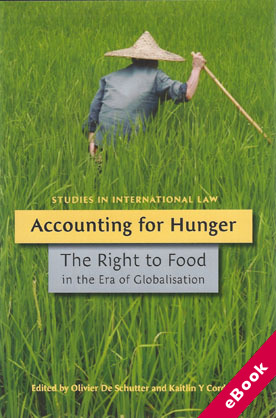
The device(s) you use to access the eBook content must be authorized with an Adobe ID before you download the product otherwise it will fail to register correctly.
For further information see https://www.wildy.com/ebook-formats
Once the order is confirmed an automated e-mail will be sent to you to allow you to download the eBook.
All eBooks are supplied firm sale and cannot be returned. If you believe there is a fault with your eBook then contact us on ebooks@wildy.com and we will help in resolving the issue. This does not affect your statutory rights.
The challenge of global hunger is now high on the agenda of governments and international policy-makers. This new work contributes to addressing that challenge, by looking at the obstacles which stand in the way of implementing a right to food in the era of globalisation.
The right to food, it argues, can only be realized if governance improves at the domestic level, and if the international environment enables governments to adopt appropriate policies, for which they require a certain policy space.
The essays in this book demonstrate how improved accountability at national level and reform of the international economic environment in the areas of trade, food aid, and investment, go hand in hand in in the move towards full realization of the right to food, while reforms at domestic level are key in effectively tackling hunger (including reforms that improve accountability of government officials).
The current regimes of trade, investment, and food aid, as well as the development of biofuels production - all of which contribute to define the international context in which States implement such reforms - should be reshaped if these national efforts are to be successful. The title -- Accounting for Hunger -- emphasises the point that accountability both at domestic and international level must be improved if sustainable progress is to be achieved in combating global hunger.
The implication is that extraterritorial human rights obligations of States (their obligations to respect the right to food beyond their national territories, for instance in their food aid, investment or trade policies), as well as the strengthening of global governance of food security (as is currently being attempted with the reform of the Committee on World Food Security in Rome), have a key role to fulfill : domestic reforms will not achieve sustainable results unless the international environment is more enabling of the efforts of governments acting individually.